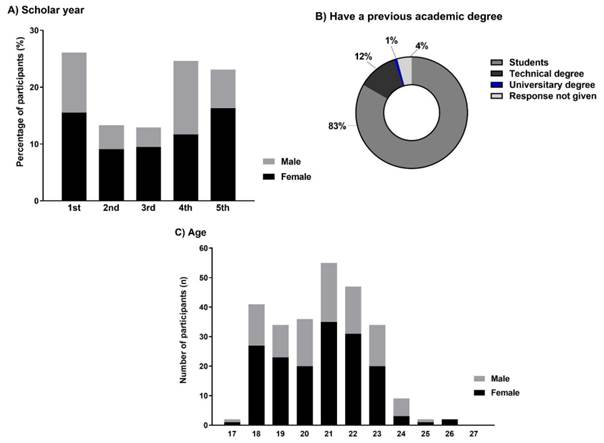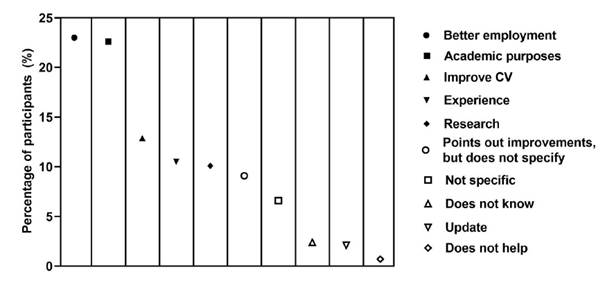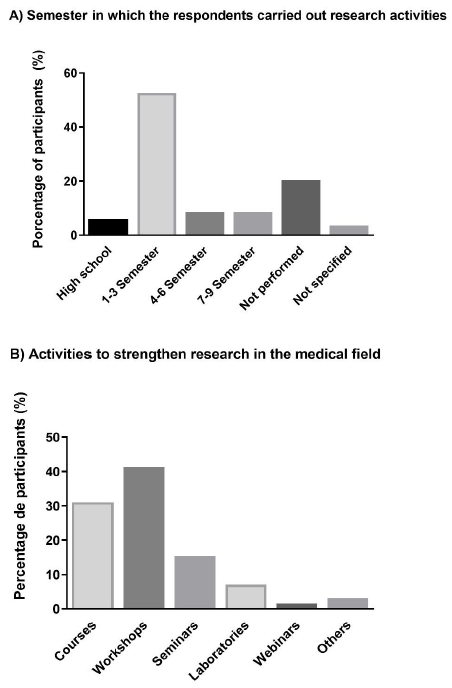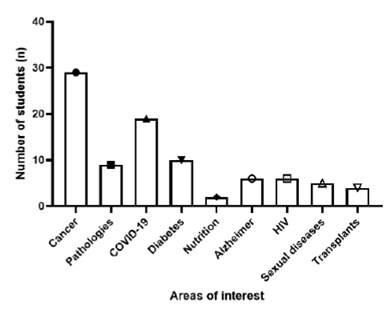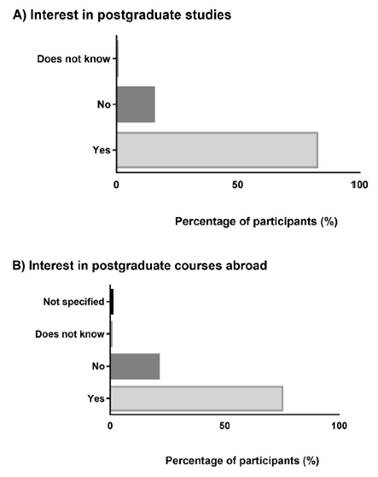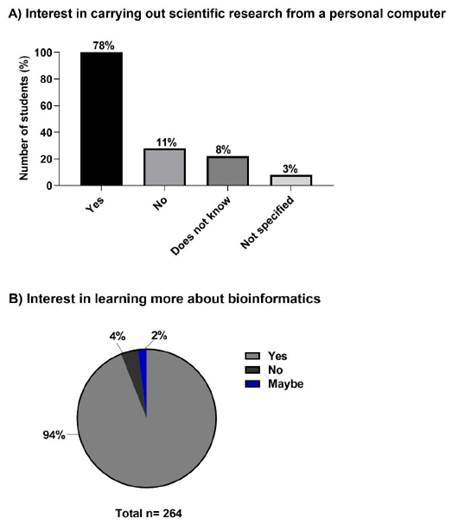Introduction
Scientific research is a cyclic process in which the acquisition and systematic analysis of data allows the comprehension of the phenomena (Meneses, 2019). The systems of evaluation, which are focused on scientific impact, consider that research with high academic value generates benefits for society (Viana-Lora & Nel-lo-Andreu., 2021; Smit & Hessels, 2021). The institutions of graduate studies estimate the social impact together with teaching and research, as the triple mission of the universities (Smit & Hessels, 2021). In the medical area, scientific research altogether with clinical practice is primordial in university studies (González-Martínez et al., 2010; Colina-Colina, 2007), where early incorporation of medical students in activities of research encourages scientific production, prospective interest, and access of physicians to scientific professions (Abu-Zaid & Alkattan, 2013). Thus, solid fundamentals in research methodology motivate the participation and development of students in this field and, have the function of expanding their knowledge, helping in the diagnosis, treatment, and prevention of diseases (Core Committee, 2002; Valenzo-Jiménez et al., 2019). In addition, it serves as an update method in the medical field; therefore, its approach since the first semesters of the university is of great relevance for the development of critical-reflexive thinking and the ability to argue ideas from a logical perspective. This leads future physicians to an improved interpretation of research to make better decisions for the patients (Abu-Zaid & Alkattan, 2013; Alejo et al., 2020). The COVID-19 pandemic was cataloged as an “Emergence of Public Health of International Scope”, less than a month after its appearance in China at the end of 2019 (Escudero et al., 2020; Xie & Chen, 2020). As a result, there was an urgent necessity to characterize the causal virus and the generation of a possible vaccine. This has been a fundamental piece to highlight the transcendence of basic and applied research in academic formation, demonstrating the need to reinforce the use of the scientific method in the university environment (Sánchez-Tovar et al., 2020; Dáher-Nader et al., 2018). Accordingly, a proficient incorporation of scientific research in the curricula of medical careers is needed for professionals to perform evidence-based medicine (Barbero, 2020; Kang, 2016). For this reason, we pose the following research question: What is the perception of medical students about scientific research, and how it has changed with the COVID-19 pandemic? As a working hypothesis, it was established that medical students consider conducting research during their professional training to be relevant and essential for solving global health problems. The objectives of this work are to evaluate the interest of students in carrying out scientific research during their university education, and how their perspective on scientific research changed.
Methods
A descriptive and cross-sectional study was performed. An autoadministered survey was created by using the online tool “Google Forms.” The participants were the students of the Faculty of Medicine of Tampico “Dr. Alberto Romo Caballero” of the Autonomous University of Tamaulipas. Students of all the semesters of this Faculty were included; the final number of respondents was 264. All participants signed an informed consent before conducting the surveys. The answers provided were kept strictly confidential. The protocol was registered with the research committee and approved by the ethics committee of the Faculty of Medicine of Tampico “Dr. Alberto Romo Caballero” under registration number 056-2021. The participation of the students was voluntary. The objective of the study was disclosed to all participants. The survey period was 8 weeks from April to May 2022. The survey was based on the combination of numerous instruments of research in medicine encompassing Likert, multiple choice, and open questions. It consisted of three sections, the first collected information of the cohort. The second section explored the perception of research in medical education. The third concerned about the impact of COVID-19 on research. This protocol was designed with the purpose of answering the research question focused on the importance of research in medical education and the effect of the pandemic on this aspect. This approach also pursued to identify those areas of opportunity that could be reinforced to promote greater interest in research in medical students. Among the variables that were evaluated were those related to the demographic data of the participants in the survey, including the current semester, age, and gender. On the other hand, aspects related to the relevance of research in medical education were questioned as well as the performance of related activities, such as conducting research stays, knowledge about short-stay programs for research, as well as the advantages of the same in the professional area. In addition, strategies that they consider can strengthen research in the medical education, main areas of interest in research among medical students, and concern in pursuing postgraduate studies at a national or international level. In the area of the effect of the pandemic on research, the survey questioned about the importance of research during the pandemic, whether they consider that going through a pandemic changed their perspective towards research, promotion of research activities and the importance of using Information and Communications Technology (ICT) tools. The inclusion criteria were active students, who provided complete information on the variables of the study. The exclusion criteria were applied when responses were obtained from interns or graduated students of this institution, students who refused to participate in the study, or who did not provide complete information. The survey was sent via forwarded email invitation, presenting the project, the purpose of the study, and the letter of informed consent before visualizing the survey. The average time of response was ten minutes, using any device (desktop computer, laptop, tablet, or cell phone) with internet access. The survey data was collected in an Excel database. Descriptive statistical analysis was performed using SPSS software (IBM, version 20). The construction of figures was performed with the GraphPad Prism version 8.0.2 program.
Results
Demographic characteristics of the population
Respondents from all school years participated, with greater participation from the first year (26%), fourth year (25%), and fifth year (23%). In all years, female participation was predominant (62%) compared to male participation (38%) (Figure 1A). Most of the respondents were undergraduate students (83%); of these, only 11% had a previous technical degree (clinical 57%, nursing 13%, and chemist 7%) and <1% had a university degree before their current studies including petrochemical engineering and a degree in nutrition (Figure 1B). Almost all the participants (93%) were between 18 and 23 years old, with a mean of 20.7 years (Figure 1C).
Transcendence of research in medical education
Many respondents (96.2%) (Figure 2A) considered it highly relevant to start their medical career with research fundamentals because they had performed it since high school (12%). In addition, 52.6% had already conducted research activities in the first semesters (1-3), against 16% in subsequent semesters (4-9) and 20% who had not conducted any research activity. The pandemic has also been a factor for more students considering scientific areas since the beginning of their university education. These data are important for modern academic programs. Since current graduate programs contemplate subjects related to research, such as research methodology, towards the last semesters, it may be necessary to contemplate a redesign according to the needs of the students that includes related activities, since the first semester. Regarding the research stays, there is a minimum proportion of students who have done them (4.9%), against 95% who have not done any research stay, which indicates that a greater divulgation of these programs is necessary, as well as promote new programs and/or collaborations with other research institutions so that students have more opportunities (Figure 2B). Students were asked what activities they consider could strengthen their interest in research and the majority considered workshops (41.5), courses (31.1%), seminars (15.4%), attendance or stays in research laboratories (7.1%), and other activities as conferences, practices at research centers and diplomats (<7%) (See Figure 5 of the annexes section).
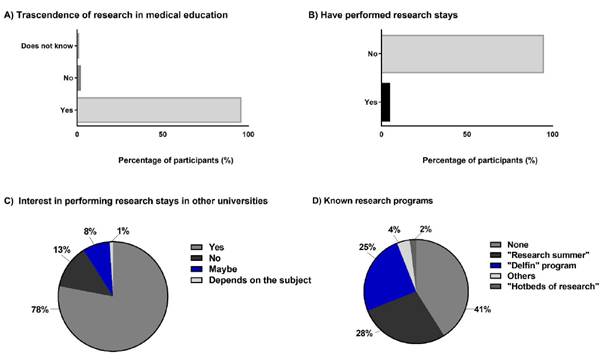
Figure 2 Research in medical education. A) Transcendence of research in medical education. B) Have performed research stays. C) Interest in performing research stays in other universities. D) Known research programs.
Among the respondents, it was found that the most interesting topics to conduct a research protocol included distinct types of cancer, COVID-19, diabetes, nutrition, Alzheimer's, HIV, sexual diseases, and organ transplants, among others (See Figure 6 of the annexes section). About postgraduate courses, it was seen that 83.3% of those surveyed were interested against 15.9% who did not consider it and 2% who had never considered it. When questioned about the possibility of doing a specialty or postgraduate studies abroad, 75% of respondents considered of interest while 21.5% were not interested (See Figure 7 of the annexes section). 98.4% of the students specified the importance of establishing professional links with researchers from other institutions, as well as 85% would like to participate in the discussion of scientific articles with medical students from other universities. 78% of respondents indicated interest in research stays in different universities (Figure 2C). 89% of respondents would like to perform multidisciplinary research to solve health problems in their community. In public universities, diverse research programs are encouraged to motivate interaction between scientists and students at university and promote scientific research among students. Respondents knew some of the programs available at this university, such as “Research Summer” (28%), “Delfín program” (25%), “Hotbeds of Research” (2%), and others, as programs for exchange during summer-winter (4%). Although, 41% of respondents declared not knowing any research program (Figure 2D).
There was no answer related to international exchange programs. In the professional area, most respondents mentioned that research activities are important for finding better employment/opportunities (23%), useful in academic formation and for improved acquisition of knowledge (22.6%), strengthening the curriculum vitae (CV) (13%), useful to acquire experience (10.5%). Besides, some respondents pointed it was a priority to become a researcher and work in academia (10.1%). A lesser percentage of the cohort (9%) mentioned that strengthening scientific research in medical students promotes scientific updating (6%) (Figure 3).
Influence of the COVID-19 pandemic on the transcendence of Research in Medical Education
Due to the pandemic, the respondents (97%) considered that research is more important, and a lesser percentage (<2%) did not consider it important (Figure 4A). In addition, the students revealed that their interest in research and getting involved in training activities increased in 52% of the cohort. In contrast with those indicating that their interest was equal (<4%) or lesser (45%) (Figure 4B). Regarding the openness of researchers to promote formative activities, 78% of students considered there is more openness due to the pandemic (Figure 4C). About the question, if whether current computer tools have allowed them to learn more about the pandemic, 97.3% said yes, and <1% responded negatively. Approximately 99% of participants considered that ICTs were useful for research during pandemics. We consider that this is a post-pandemic lesson, the use of ICT tools adapted during lockdown, should be integrated into current face-to-face return to facilitate research activities and keep medical education at the forefront (Figure 4D ).
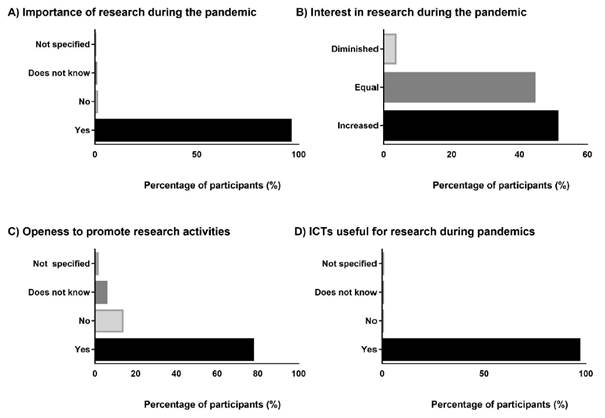
Source: Elaborated by the authors
Figure 4 Effect of the pandemics in medical education. A) Importance of research during the pandemic. B) Interest in research during the pandemic. C) Openness to promote research activities. D) Information and Communication Technologies useful for research during pandemics.
Due to the almost two years of lockdown, various research projects began or continued virtually. This situation triggered students to look for digital tools to do research from their personal computers. 78% of respondents opined it was possible to do scientific research from their computer, 11% answered no, and 8% considered not knowing how to perform research in this modality. In addition, 94% would like to know more about how to implement bioinformatics in the medical area (See Figure 8 of the annexes section).
Discussion
Diverse studies have reported a reduction of almost 25% of physicians who conduct research in faculties of medicine, as a phenomenon happening since decades ago in the USA and Canada (Solomon et al., 2003; Siemens et al., 2010). With the advent of the COVID-19 pandemic, it was clear that investing in research is of crucial importance for universities, as well as strategies for its reinforcement (González-Martínez et al., 2010; Lucey et al., 2022; Centeno & Martínez-Carrasco 2003). Currently, many educational programs in medicine are under renovation. Our study showed that among those reforms, it is necessary to increment the efforts to provide the students with early exposure to research whose interest was strengthened by the pandemic. Traditionally, subjects such as “Methodology of Research” and “Research Projects” are taught in the last semesters of the curricular maps. Nonetheless, some alternatives could be implemented so that students start or continue scientific research since the first semesters. One of them is exercised in the classroom, where the professors could give practical examples, and involve them in case studies and epidemiological approaches. Even all basic subjects could include activities such as attendance to researcher´s lectures, article writing exercises to motivate interest in hypothesis formulation, systematic search of the literature, manuscript drafting, synthesis, teamwork, and critical thinking training, coupled with the effort among students to publish their work in scientific journals. In a study from the Netherlands, Waaijer et al., (2019) found that the students who published during undergraduate studies tend to be more active in research after graduating; therefore, an early approach to research influences long-term scientific careers. Among boundaries for performing research were limited divulgation of programs with this focus, non-availability of an updated database of available research lines, and restricted knowledge about scientific careers in the medical area. In our study, we found similar limitations, and an interesting point was the fact of having tutors who perform research activities, which encourages students to be more involved in this area. In addition, those students who have follow-up throughout the university also tend to do more research-related activities. Funston et al., (2016) developed functional proposals as the creation of a research office by students, along with elective modules in the curriculum focused exclusively on research. When questioned if they wish to develop research as a professional exercise, in a comparison among genre and scholar year, we observed that in the first year, the percentage of surveyed students of both genres that do consider it is similar (~50%) in contrast to last-year respondents where the female gender drops to 40% and the male gender to 30%. Romaní-Romaní & Gutierrez (2022) determined a similar trend in the decline of students who consider research as a long-term career. They explain that the exposition to commitments and requirements in this ambit, aside from a higher exposure to the clinical environment, might provoke this reconsideration. Although it was not the objective of this study, these indexes indicate that there is an area of opportunity to explore changes in genre perspective and comprehend the observed differences. Funston et al., (2016) performed a study about the perception of research in medicine worldwide with the participation of 38 countries. Important barriers were found in the development of research-oriented medical careers, such as lack of adequate training, lack of time, and difficulty in finding a research tutor. Romaní-Romaní & Gutierrez (2022) in Peru, found an augmented research practice by implementing mandatory courses from the third year of the degree, which caused an increase in students who participated in original articles. Chellaiyan et al., (2023) in India, also mentioned that a mandatory research project translates into a higher number of students performing long-term research. Moreover, research scholarships could be a strong motivator for students. In our work, among respondents' perceived benefits of medical research, >50% noted that it helped them find a better job in the clinical area or improve their resume, and 10% noted that it was a priority for a long-term career in research. Muhandiramge et al., (2021) in an Australian study, found that only 20% of their cohort had an interest in academia as a motivator, which is consistent with our findings. Among the strategies, the implementation of communication platforms or social networks for the medical community was a cornerstone to divulge research from undergraduate students, training opportunities, and student experiences that might be useful for others interested in research activities through videos. In our experience, the organization of research congresses with undergraduate students either on-site or virtual, motivates the students to integrate into new scientific projects. Osman (2016) in a Sudanese study emphasized the preparation of a thesis as a qualification requirement, as well as the strengthening of collaborations with research centers. He also proposes the model of research work in small groups, which can be a reasonable option in medical schools. An interesting observation by El-Achi et al., (2020) in Lebanon, is the attitude of the students towards investigation, where 99% perceive it as valuable and exciting, against 76-90% perceiving it as time-consuming and complicated. As our results, there is a high percentage (90%) of students willing to participate in any research-related task. Al-Hilali et al., (2016) in Arabia, found comparable results where undergraduate students remarked that their research resources/opportunities are more limited. For the lack of time reported as an obstacle, the proposed solution is asynchronous basic courses, as well as taking advantage of available digital resources such as platforms or digital libraries. In our work, respondents opined that research activities should be done aside from semester periods since this prevents them from dedicating enough time. An alternative to this problem is the use of remote resources to synchronize both, studies, and research. Globally, we have mentioned the similarities and differences of other studies concerning ours. In Latin America, there is a lack of studies that explore this approach. In a study conducted on Peruvian medical students, a substantial percentage (54.7%) considered the lack of infrastructure as a limitation for performing research. They also evaluated the interest in performing research after graduating from medicine. Interestingly, some factors related to doing research were being male, the location of the university, having studied in a public university, conducting extracurricular research, presenting in congresses, authoring a thesis to graduate, and being an epidemiologist or a teacher (Mejía-Álvarez et al., 2017). Moreover, Romero-Leguizamón et al., (2016) refer to “hotbeds of research” which are integrated by creative, flexible tutors with capabilities and experience in research with the main function of the integral formation of students to develop skills in organization, text writing, and practice in laboratory activities. In a study performed on 430 Latin-American medical students, 98% evaluated that scientific research is important during undergraduate formation. Nonetheless, from this cohort only 20% had published scientific articles. As a result, medical students considered that the integration of research groups, societies, and/or “hotbeds” promotes their incursion into scientific research (Aveiro-Róbalo et al., 2019). About the COVID-19 pandemic, one of the most accentuated effects was the accelerated “platforming” of education. In this aspect, it was seen that the influence of the pandemic has increased the interest of the students of all the semesters in developing research. In addition, the majority (97%) mentioned that online learning using computer tools allowed them to learn more about the pandemic. Further, respondents indicated they began or continued research projects online. 78% of participants indicated that could perform scientific research from their computer and 94% manifested to be interested in learning more about bioinformatics in the medical field as it encompasses basic and applied research with different technological approaches (Pin-Pin et al., 2021). Other authors state about research, that the benefits developed during the COVID-19 pandemic, as online resources, are incorporating effectively into the structure of medical education (Conolly & Abdalla, 2022). Despite the negative effects, such as lockdown and limitation of practical subjects, among others, the respondents considered that precisely the creation of platforms, implementation of synchronic/asynchronous courses, and even interactive workshops, can be used to promote an early approach to research. This latter can be extended to the general population as scientific divulgation to transmit knowledge and public health awareness. With the on-site return to universities, it is a priority to conserve, improve, and use those tools developed with Information and Communication Technologies so that they can be a strategy to overcome the barriers detected in this study. Our limitations include the statistical power due to the size of the cohort, as well as being unicentric, which would have greater scope with an increased number of respondents. In addition, it would be of interest to know if these findings are observed in other universities along the country and if there are perceptible differences between public and private centers. The strengths include the exploration of a topic that could have a positive impact on the redesign of curricular maps, the implementation of curricular and extracurricular research training activities, and the study of the pandemic effect on the perception of research in medical education. Among the perspectives, it would be interesting to compare against graduated students and analyze the percentage of the ones that choose to develop a long-term research career. Finally, it is necessary to perform more studies in Latin America and if possible, establish collaboration nodes that explore this problem and propose possible solutions.
Conclusion
This paper highlights the interest of medical students to perform scientific research, which increased due to the pandemic. This will contribute to the redesign of educational curricula focused on teaching medicine based on early exposure of the student to basic, clinical, and applied research. In addition, it will reinforce the divulgation of programs with this focus, as well as incentive curricular, and extracurricular research activities. With this, it seeks to encourage early scientific callings with research programs, courses, and training, which allow them to combine it with clinical practice or to pursue long-term research as a profession.
Future Research Lines
It is proposed as a future research line, the analysis of the implementation of the strategies proposed in this article, including participation of medical students since the first semesters of formation, in events such as conferences, research workshops and collaboration in writing and publication of articles. As a comparative element, to study the percentage of students from the different semesters who join these activities, comparing these changes between generations. As well as analyzing which of these proposals are most effective for an early approach to science. In the long term, the study of undergraduate students who chose to dedicate themselves to research either jointly with their clinical practice or exclusively. Together with an analysis of both the motivation and the record of the different lines of research in which they focus their efforts.











 nueva página del texto (beta)
nueva página del texto (beta)


